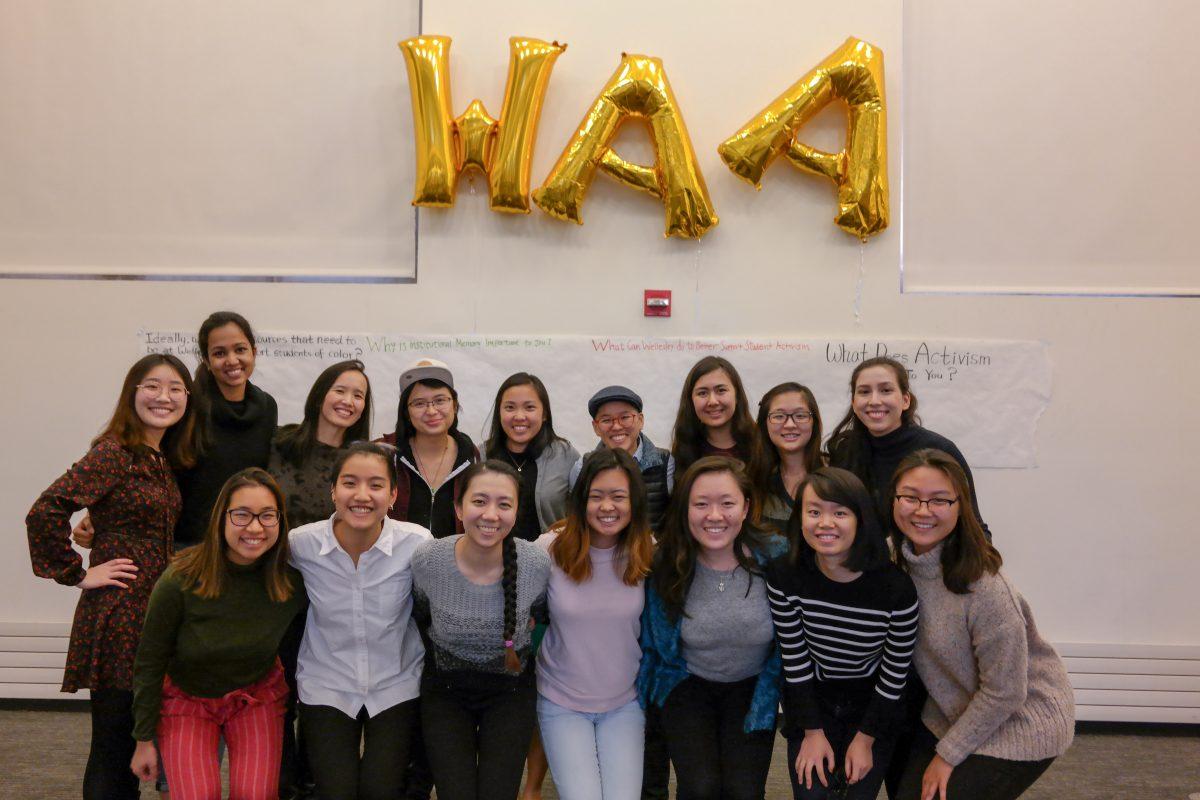This past weekend, Wellesley Asian Alliance (WAA) commemorated its 25th anniversary with a two-day symposium on Nov. 10 and 11. The event, WAA SLAMS BACK, featured a wide array of speakers and events, including presentations by students, faculty and alumnae. The event organizers estimate that around 40 attendees, including students, alumnae, professors and faculty, joined in the symposium.
The highlight of the two-day event was Saturday’s 25th anniversary luncheon, which included discussions and presentations by students as well as notable alumnae including Elaine Chin ’95, co-founder of WAA, and Lin Chan ’01, who was involved in the creation of WAAM-SLAM I.
In addition to marking the anniversary of its establishment, WAA hosted the event to celebrate the success of its campaign to secure a tenure-track position in the Asian American Studies (AAS) program. After a year-long effort led by the organization, the administration agreed to the group’s demands and will instate a tenure-track professor in the AAS program in the fall of 2019.
According to Professor Yoon Sun Lee, Asian American Studies is not an official program or department at the College but was approved as a minor within American Studies in the spring of 2013. The foundational course, AMST 151, The Asian American Experience, was first taught by Professor Jim Kodera in 1984 and continues to be taught by a rotating group of faculty.
Rebecca Leu ’19 and Alice Li ’19, WAA co-coordinators, explained the recent history of the movement to expand AAS at Wellesley. Last year, a group of WAA members and other concerned students formed the Asian American Studies Initiative to advocate for a tenure-track position in the program. Many students were concerned by the lack of courses in the minor and a lack of resources for the track in general. AAS has neither appointed faculty nor an administrative assistant. Leu highlighted this deficiency, saying, “For example, next semester we only have one AAS course, even though we have a visiting post-doctorate [in AAS], Professor Paul Nadal.” With a tenure-track professor, the program would be guaranteed two courses each semester, ensuring that students interested in pursuing AAS would be able to do so.
Looking to transform the frustration many students experienced in the wake of the 2016 election into action, the students turned to the initiative, which they felt was more vital than ever in light of proposed faculty reductions. Through the group’s organizing, over 40 alumnae and current students wrote to the administration to advocate for the position.
Leu and Li expressed their appreciation for the support the initiative received, saying, “We’re pretty confident that no other department or program had that many students advocating for them.”
In response, the College announced plans to hire a tenure-track professor within the program in fall 2019. Leu and Li noted that they hope to involve as many students as possible in the hiring and interview process.
Professor Lee noted that the triumph was the result of decades of hard work.
“WAA has been tirelessly dedicated to the cause of AAS since its inception. In regular meetings with the administration, with faculty and students, WAA has, for more than 20 years, reminded everyone of the importance of AAS as a field of study. I doubt that any of the above could have happened without the work of many generations of WAA. Their activism has been tremendously effective and inspiring,” she said.
In regards to the presentations and discussions which occurred at the symposium, Li said, “Overall, I felt inspired by the deep legacies of student action that came before us, and I also felt that we need to do a better job of passing on our knowledge to future generations of e-boards.”
The weekend symposium also recognized the work of the Wellesley Asian Action Movement/Sisters Leading Action for Multiculturalism (WAAM-SLAM), who campaigned in 2001 to address under-resourcing and underrepresentation of Asian American and Latinx faculty and students. A second iteration of the movement, WAAM-SLAM II, was created in 2014 to advocate for ethnic studies, multiculturalism and a reallocation of resources.
“Most of today’s resources for marginalized students would not exist if it weren’t for student activism. However, one thing we learned at our 25th Anniversary event was that the demands that WAAM-SLAM I and II made still have not been fully met, and multiple generations of students have made similar demands,” Leu and Li said.
Professor Lee commended the students, saying, “I’d like to congratulate WAA for its 25th anniversary celebration, and thank all of the students and alums who participated in it. It was a wonderful, informative and very moving tribute to the power of student activism at Wellesley.”
She noted that the movement was “a triumph of collaboration” and was the result of generations of dedicated effort. Professor Lee additionally pointed to the instrumental role played by Karen Shih, the advisor to students of Asian descent, in bringing people together and providing support.
Leu and Li also commented that despite the recent successes of WAA-led initiatives, there is still much work to be done.
“This is one win, but there must be many more before we can say we have a strong ethnic studies curriculum at Wellesley. The South Asian Studies department needs more resources, classes in AAS need to better discuss and acknowledge South, Southeast Asian and Pacific diasporas and there needs to be an established Ethnic Studies major here at Wellesley,” they said.






